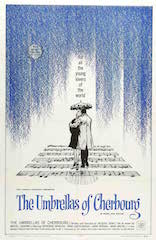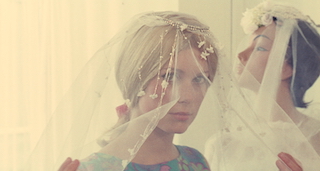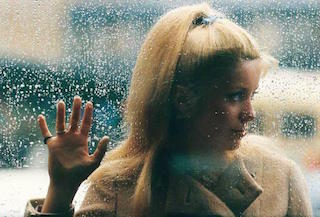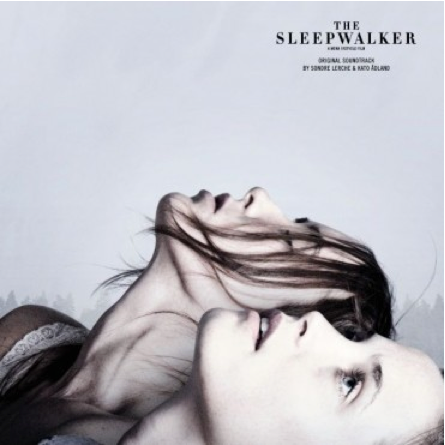 I was in college when a dear friend said, “You have to watch this crazy French movie. It’s weird, but you’ll like it.” When I dubiously sat down with her to watch Umbrellas of Cherbourg, little did I know that I was about to be swept off my feet. I loved it instantly, but I wasn’t sure why; it was pretty to look at and it was French, and sometimes that’s enough for me. It was definitely nothing like any film I had ever seen before. It took a second viewing—and then a third and a fourth and a…you get the idea—to understand why Jacques Demy’s musical masterpiece was so brilliant.
I was in college when a dear friend said, “You have to watch this crazy French movie. It’s weird, but you’ll like it.” When I dubiously sat down with her to watch Umbrellas of Cherbourg, little did I know that I was about to be swept off my feet. I loved it instantly, but I wasn’t sure why; it was pretty to look at and it was French, and sometimes that’s enough for me. It was definitely nothing like any film I had ever seen before. It took a second viewing—and then a third and a fourth and a…you get the idea—to understand why Jacques Demy’s musical masterpiece was so brilliant.
Umbrellas of Cherbourg was part of the French New Wave movement of the late 1950s and 1960s: an informal movement of filmmakers (such as Demy, François Truffaut, and Jean-Luc Godard) that involved rejection of French cinematic conventions of the time, bold writing that brought modern themes to the forefront, and experimentation with film as an art form. This brief movement generated some of the greatest films in French cinematic history—or really in the history of cinema in general. Umbrellas turned out to be my first exposure to French New Wave film (I would get into the work of Truffaut and Godard the following summer).
And what an introduction it was! Demy was certainly experimenting with the musical genre when he wrote and directed Umbrellas. While other movie musicals of the time consisted primarily of dialogue, periodically interrupted by song and dance (some for no other reason than to create a spectacle, doing little to nothing to serve the story), Demy’s script is entirely sung. That’s right: every line of the entire film is sung. In French. But doesn’t that sound like an opera? Yes, but this is not La belle Hélène. It’s a modern story about young love and a couple of kids who are trying to find their way in the world.
Guy (played by Nino Castelnuovo) is a garage mechanic and Geneviève (Catherine Deneuve) works in the umbrella shop owned by her mother, Madame Emry (Anne Vernon). We first meet Guy at the garage, singing about car repairs and how much he is itching to get off work. He hurries to the umbrella shop to meet Geneviève, who is standing in the window among what appear to be so many confections—the brilliant colors making the shop and everything in it look like pastries. Guy and Geneviève repeatedly confess their love and pledge undying devotion, making promises and plans for the future, dreaming of children and castles in the sky—or rather, Guy wants to open his own service station, and Geneviève wants to not sell umbrellas.
 The first crisis comes when Madame Emry receives a notice of a large payment due in very short order. Since she does not have the funds on hand, Geneviève convinces her maman to sell her pearls, and so mother and daughter go to the jeweler to plead their case. Enter the handsome diamond merchant Roland Cassard (Marc Michel), who, struck by Geneviève’s beauty and by her current plight, purchases the pearls and instantly ingratiates himself to Mme. Emry (who is convinced he should marry her daughter). When Geneviève tells her (rather controlling) maman about Guy, all of her concerns about not getting her mother’s approval are confirmed. But Geneviève’s loyalty and love are unwavering.
The first crisis comes when Madame Emry receives a notice of a large payment due in very short order. Since she does not have the funds on hand, Geneviève convinces her maman to sell her pearls, and so mother and daughter go to the jeweler to plead their case. Enter the handsome diamond merchant Roland Cassard (Marc Michel), who, struck by Geneviève’s beauty and by her current plight, purchases the pearls and instantly ingratiates himself to Mme. Emry (who is convinced he should marry her daughter). When Geneviève tells her (rather controlling) maman about Guy, all of her concerns about not getting her mother’s approval are confirmed. But Geneviève’s loyalty and love are unwavering.
Then the second crisis hits: Guy receives his draft notice from the military, and both his and Geneviève’s lives are changed forever. During the beautifully memorable and Oscar-nominated song “I Will Wait for You,” the lovers pledge to stay true to one another until Guy’s return; and they consummate their love. The music swells and the colors are electric—helping the audience see and hear the passion and intensity of their love. The song concludes with the long, sorrowful shot of a train leaving the station, leaving Geneviève alone on the platform in a cloud of steam.
The third crisis comes two months later: Geneviève is pregnant. The timing of the news is somewhat inopportune since Mme. Emry has invited Monsieur Cassard for dinner, after which Cassard asks Mme. Emry for Geneviève’s hand in marriage. When Geneviève begins to show, she and her mother agree that Cassard must be told of her condition. How will he react? Geneviève sings:
“Do you believe he’ll take me like this? If he refuses me as I am, it means he doesn’t have deep feelings for me. But if by some unlikely chance, he accepts me, I’ll have no reason to doubt him, and I’d be a fool to reject him.”
Though the lyrics are much prettier in French, it is clear that the passion of her first love is fading and the practicalities of life are looming large in her thoughts. Cassard accepts Geneviève without hesitation, and she, in turn, accepts his marriage proposal. After the wedding, they get straight into Cassard’s Mercedes and drive away, leaving Cherbourg behind without so much as a look-back.
Months later, Guy returns to find his godmother on her deathbed and Geneviève has gone from Cherbourg and from his life. The umbrella shop is gone too—sold and turned into a Laundromat. Gone are the bright colors; gone are the vibrant patterns; all that remains is cold, stark white. The transformation is startling, and a powerful visual representation of the absence of the intense love that once was. After the death of his godmother, Guy manages to find solace with her former caretaker, the shy and lovely Madeleine. Madeleine helps Guy pull himself together and focus on making something of his life.
Cut to four years later, on a snowy night in December. We see the service station that Guy opened with Madeleine; the two now have a son. The whole world is covered in a thick blanket of snow. It is on this wintry night that the former lovers are suddenly, unexpectedly, and briefly reunited. The noticeable absence of color has a sobering effect: the intense passion is entirely gone, and both characters are older and wiser. As Geneviève drives away for the last time, the music swells to an unprecedented crescendo, the camera dollies out to take in the white, wintry world, and the moment is intensely beautiful and immensely sad all at the same time.
Every technical aspect of Umbrellas is masterful en pointe. The film was nominated for several Academy Awards (including best foreign language film, best writing, and best score), and it won what is now the Palm d’Or at Cannes in 1964. As an artist, I love the bold and quirky art direction in Umbrellas: the saturated hot pinks, the neon yellows, the rampant floral patterns, and the Delft tiles all play their part in telling the story. The riot of color, pattern, and texture in the setting serve to intensify everything in the story—the passion of first love, the drama of life events, and the tragedy of love lost. Everything in the film serves the story—the music, the art direction, the costumes, the camera work; the changes in setting, color and musical themes all work together beautifully and flawlessly.
The complexity of the love story, for me, lies in the fact that Geneviève and Guy each realize their dreams by not being together. Early in the story, when they are talking about the future, it all sounds very sweet and lovely on the surface. But upon closer examination, it is clear they want different things: he wants a son, she wants a daughter; he wants to open his own gas station, she wants nothing of the sort. Sure, the love between them and their respective spouses is not the same as what it was between Guy and Geneviève, but is that really a bad thing? Is the story a heartbreaking romance of young lovers separated by fate and circumstance, or is it simply a presentation of reality, cold and harsh though it may seem? Is it a happy ending to a sad story? Or a sad ending to a love story? Or is it both? That might be a debate between the romantics and the realists, but I think that is why Demy used every arrow in his masterful cinematic quiver to elevate this story of two modern kids trying to find their way in the world to the level of a grand dramatic opera. It’s Life presented as larger than life. If you haven’t seen it, I highly recommend that you watch it—at least twice, because it takes (at least) a second viewing to even begin to process this brilliant film.


